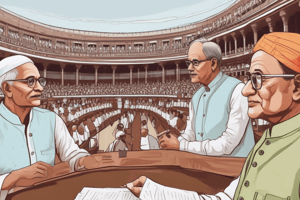Podcast
Questions and Answers
What is the primary responsibility of the Rajya Sabha?
What is the primary responsibility of the Rajya Sabha?
- Ensuring federal balance (correct)
- Introducing money bills
- Representing the collective will of the nation's electorate
- Passing constitutional amendments
Which house of Parliament has the main legislative powers to pass constitutional amendments?
Which house of Parliament has the main legislative powers to pass constitutional amendments?
- Lok Sabha (correct)
- Parliamentary Committees
- Joint Sitting
- Rajya Sabha
In case of a bill rejected by the Rajya Sabha, where can it be sent for a joint sitting?
In case of a bill rejected by the Rajya Sabha, where can it be sent for a joint sitting?
- Parliamentary Committees
- President
- Lok Sabha (correct)
- Rajya Sabha
Who presides over a joint sitting of both houses during decision-making?
Who presides over a joint sitting of both houses during decision-making?
Which parliamentary body is responsible for scrutinizing government workings and drafting new laws?
Which parliamentary body is responsible for scrutinizing government workings and drafting new laws?
Who serves as the Chairperson of the Rajya Sabha?
Who serves as the Chairperson of the Rajya Sabha?
How often do members of the Rajya Sabha retire?
How often do members of the Rajya Sabha retire?
What is the total number of members in the Lok Sabha?
What is the total number of members in the Lok Sabha?
Which house in the Union Legislature is popularly elected?
Which house in the Union Legislature is popularly elected?
Under which principle does the Union Legislature primarily function?
Under which principle does the Union Legislature primarily function?
Flashcards are hidden until you start studying
Study Notes
Union Legislature: The Pillar of India's Democratic System
At the heart of India's robust constitutional framework lies the Union Legislature, a dynamic institution that plays a crucial role in shaping the nation's laws, policies, and governance. Comprising two houses, the Union Legislature consists of the Rajya Sabha (Council of States) and the Lok Sabha (House of the People).
Rajya Sabha
The Rajya Sabha is a permanent body that represents the interests of the states and Union Territories (UTs) with legislatures, with each state and UT with a legislature having a minimum of three and a maximum of twelve members. These members serve for a term of six years, with one-third retiring after every two years. The Vice President of India serves as the Chairperson of the Rajya Sabha, and in their absence, the Deputy Chairman assumes this role.
Lok Sabha
The Lok Sabha, on the other hand, is a popularly elected house with 543 members, including those representing the Union Territories of Delhi and Puducherry. Members are elected directly by the people, with each member serving a term of five years, after which a general election is held. The Speaker of Lok Sabha is elected by its members to preside over its proceedings.
Working of the Union Legislature
The Union Legislature primarily functions under the principle of bicameralism, where each house has its own powers and responsibilities. The Rajya Sabha is primarily responsible for ensuring a federal balance, representing the interests of various states and UTs, while the Lok Sabha represents the collective will of the nation's electorate.
The main legislative powers of the Union Legislature lie with the Lok Sabha, which has the authority to pass constitutional amendments, money bills, and non-money bills. Money bills can only be introduced in the Lok Sabha and must be passed by it before being presented to the President for assent, although the Rajya Sabha has the right to discuss and make suggestions.
The Joint Sitting of Parliament
When a bill passed by the Lok Sabha is rejected by the Rajya Sabha, it can be sent to a joint sitting of both houses, called Rajya Sabha-Lok Sabha Joint Sitting. This joint sitting is presided over by the President or, in their absence, by the Speaker of the Lok Sabha. During a joint sitting, all members from both houses vote together, and any bill passed by a simple majority is considered a law.
The Role of Parliamentary Committees
Parliamentary committees are an integral part of the Union Legislature, helping to scrutinize the workings of the government and drafting new laws. These committees are appointed by the Speaker and the Chairman of the Rajya Sabha and include members from both houses.
The Role of Members of Parliament
Members of Parliament (MPs) play a significant role in the legislative process, representing their constituencies and ensuring that their voices are heard. MPs can participate in the debates, propose amendments, and play an active role in shaping policy decisions.
In conclusion, the Union Legislature is a vital component of India's democratic system, maintaining a delicate balance between the federal and popular interests of the nation. By upholding the principles of democracy, justice, and equality, it strives to safeguard the rights and well-being of India's citizens, ensuring that their voices are heard and their needs are met.
Studying That Suits You
Use AI to generate personalized quizzes and flashcards to suit your learning preferences.




